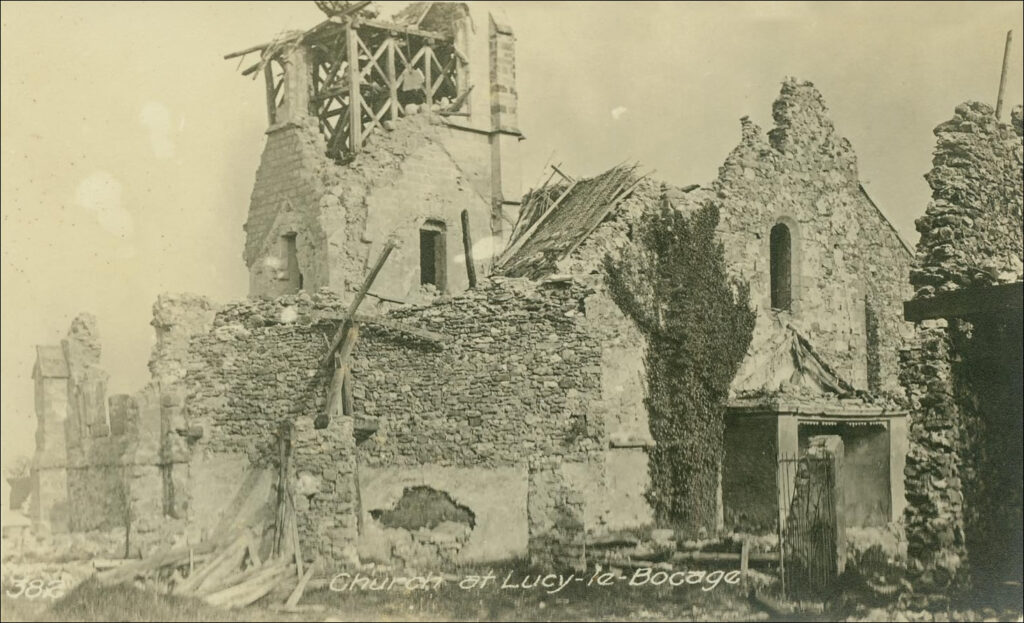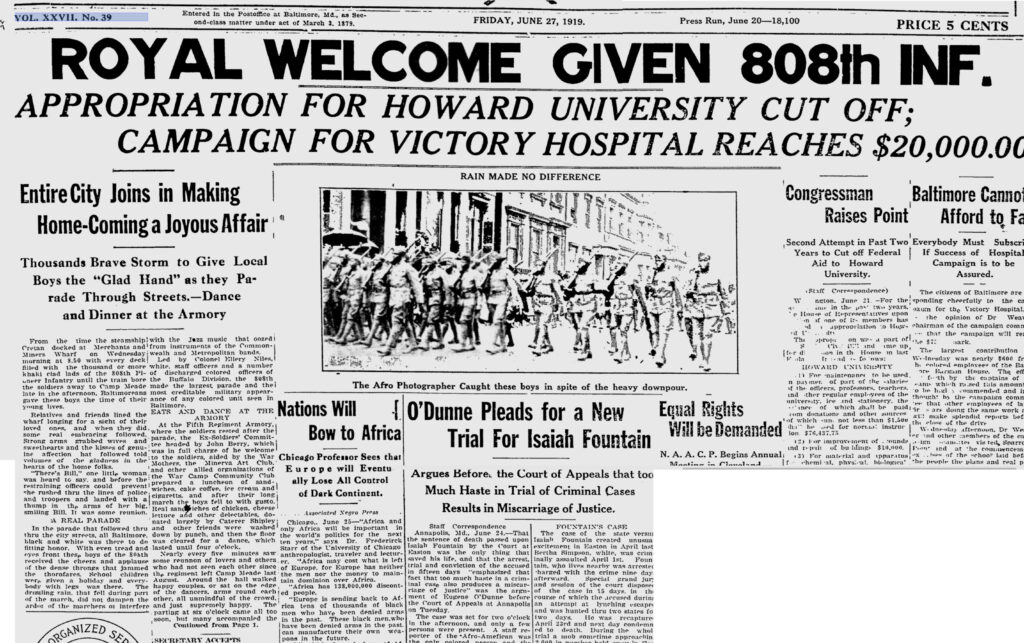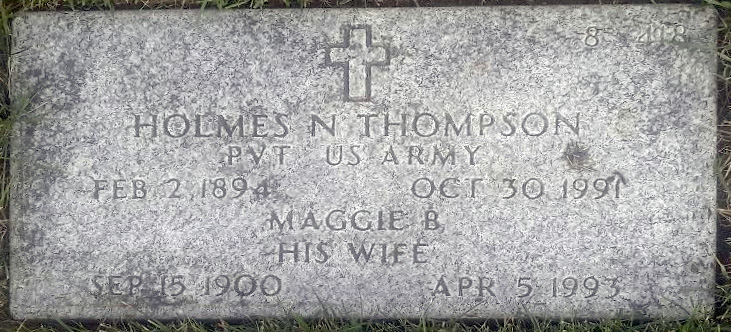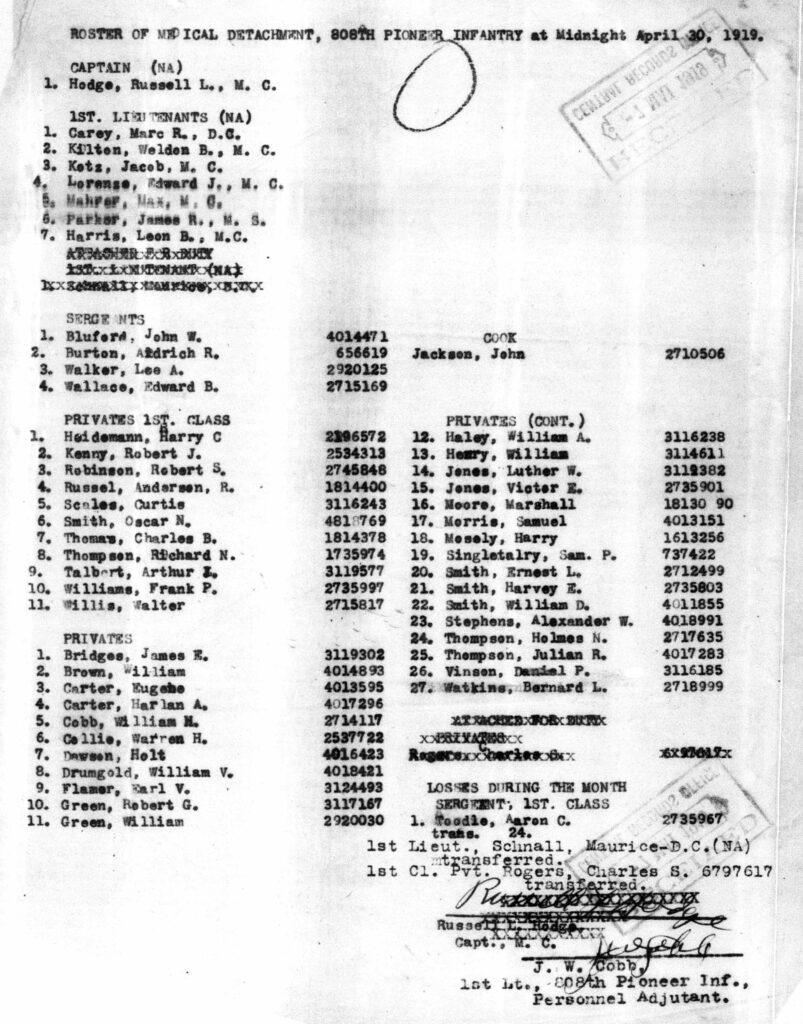Holmes Napoleon Thompson was born Feb. 2, 1894 in Mason, Tipton County, Tenn., the son of William Thompson and Martha Adams and the oldest boy of six siblings.
Federal census report that he completed four years of high school and could read and write, which at that time was quite an accomplishment.
Holmes N. Thompson, serial #2717635, was inducted into the United States Army as a private at the age of 24 on April 28, 1918 and was sent to Camp Meade, Annapolis Junction, Md., along with 36 other young men from Tipton County for training, being placed with 20th Co., 154th Depot Brigade, and then Machine Gun Company, 808th Pioneer Infantry after his initial training.
While in training, Pvt. Thompson sent a letter to the Covington Leader, thanking his friends for their support before he left. It was published in the June 6, 1918 edition of The Covington Leader.
From Camp Meade, MD.
The editor of this paper has lately received a letter from Holmes N. Thompson, son of Wm. Thompson, a well known colored citizen of the 10th district, who is now in training at Camp Meade, Md. Holmes asked us to express to the friends who contributed sums of money to him before boarding the train to Camp Meade his most sincere and grateful thanks. The contributions thus made amounted to eight dollars. Thompson also sends us the following verse, composed by himself, with a request for publication:
I’m now a soldier in Camp Meade.
Here’s what I expect to do:
Do everything in a snap and go right on through.
Some day I may go to France.
Here’s what I want to do:
Stand at attention, shoulder my gun
And shoot Kaiser Bill half in two.
PRIVATE HOLMES N. THOMPSON, 29th Co. 154 Dep. Brig., Camp Meade, Md.
On Sept 1, 1918, Thompson and the 808th Pion. Inf., left Hoboken, New Jersey and set sail for France. Of the American Expeditionary Forces (A.E.F.), the 808th was the first of the pioneer infantry regiments to arrive in France during the Great War, landing their first troops at Brest, France on Sept. 7, 1918. The unit served as salvage workers, constructed roads, railroads, bridges, and hospitals under the 1st and 2nd Army Engineers. Thompson would later be assigned to the Medical Detachment, most likely becoming a first-aide runner or ambulance driver.


Life was not easy for a black soldier in the military during World War I, with many being placed in menial jobs, but the soldiers attached to pioneer units definitely came under fire and the 808th was no exception, with the majority of their nine months in Europe spent near the front lines. Upon arrive, they quickly marched and arrived at Lucy-le-Bocage on Sept 12, 1918, then on to Aubriville St. Pierre a week later. They arrived at Pompey Oct. 6 and at Aubriville-en-Argonne on Oct. 29, 1918, hauling ammunition and cutting barb-wire entanglements, among other perilous duties in support of the Battles of the Meuse-Argonne. More than one million American soldiers took place in the battles in the dense Forest of Argonne and along the Meuse River, the A.E.F.’s largest WWI operation. The battle was hard fought for more than four months and ended with 26,000 Americans dead and 120,000-plus casualties, including soldiers of the 808th Pioneer Infantry. The 808th made their way back to the port city of Brest seven months after they landed on April 28, 1919.
Many WWI soldiers returned home shell-shocked, injured, and lost, especially African American soldiers. German shelling and gas attacks killed and injured several African American Pioneer Infantry soldiers, the result of inadequate preparation and a lack of defensive support, with members of the 808th Pioneer Infantry reporting after the war that they did not receive instructions on how to use their gas masks until they were within enemy range.
The 808th Pioneer Infantry, including Private Holmes N. Thompson, left Brest June 12, 1919, sailing on the USS Maui, returning to the United States a week later. He was discharged on June 28, 1919 at Camp Lee, Va.

There is no evidence that Holmes N. Thompson ever returned to Tipton County to live again after he returned home. He lived the rest of his life in Michigan, where he worked as a postman and married at least three times.
Pvt. Holmes N. Thompson died on Oct. 30, 1991 at Battle Creek, Michigan and was buried the next day at Ft. Custer National Cemetery , Section 8, site 418.



